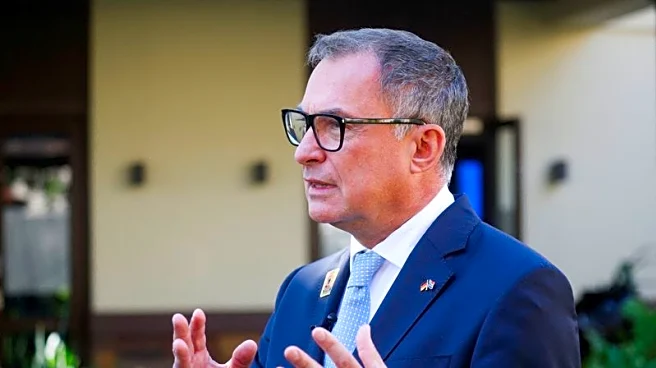What's Happening?
The Milwaukee Bucks have signed Alex Antetokounmpo to a two-way contract, marking a historic moment in the NBA as it is the first time three brothers are signed on active roster contracts with the same team. Alex, the youngest of the Antetokounmpo siblings, joins his older brothers Giannis and Thanasis in Milwaukee. Alex has been playing in Europe since 2024, following his time in the G League after going undrafted in 2021. He previously played for the Raptors 905 G-League team during the 2021-22 season and had a stint with Milwaukee's G league squad from 2022-24. To make room for Alex, the Bucks are waiving guard Jamaree Bouyea from a two-way contract.
Why It's Important?
This signing is significant as it strengthens the familial bond within the Milwaukee Bucks, potentially enhancing team chemistry and performance. The presence of three Antetokounmpo brothers on the same team could attract more fan interest and media attention, boosting the team's profile. Additionally, Giannis Antetokounmpo's leadership and influence, having recently led the Greek national team to a bronze medal in the 2025 EuroBasket tournament, could be further amplified with his brothers by his side. This move also highlights the Bucks' strategic approach to building a cohesive team environment, which could translate into better on-court results.
What's Next?
With Alex joining the Bucks, the team will likely focus on integrating him into their system and maximizing the potential of having three brothers on the roster. The Bucks may also explore marketing opportunities that capitalize on the unique family dynamic. Fans and analysts will be watching closely to see how this affects team performance and whether it leads to increased success in the upcoming NBA season. The Bucks' management will need to ensure that the roster changes do not disrupt existing team dynamics and that Alex's transition is smooth.
Beyond the Headlines
The signing of Alex Antetokounmpo could have broader implications for the NBA, potentially inspiring other teams to consider familial connections as a factor in team building. It also raises questions about the role of family dynamics in professional sports and how they can impact player performance and team cohesion. This development might encourage other players with siblings in the league to seek similar opportunities, potentially leading to more family-centric team compositions in the future.










